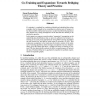Free Online Productivity Tools
i2Speak
i2Symbol
i2OCR
iTex2Img
iWeb2Print
iWeb2Shot
i2Type
iPdf2Split
iPdf2Merge
i2Bopomofo
i2Arabic
i2Style
i2Image
i2PDF
iLatex2Rtf
Sci2ools
142
click to vote
NIPS
2004
2004
Co-Training and Expansion: Towards Bridging Theory and Practice
Co-training is a method for combining labeled and unlabeled data when examples can be thought of as containing two distinct sets of features. It has had a number of practical successes, yet previous theoretical analyses have needed very strong assumptions on the data that are unlikely to be satisfied in practice. In this paper, we propose a much weaker "expansion" assumption on the underlying data distribution, that we prove is sufficient for iterative cotraining to succeed given appropriately strong PAC-learning algorithms on each feature set, and that to some extent is necessary as well. This expansion assumption in fact motivates the iterative nature of the original co-training algorithm, unlike stronger assumptions (such as independence given the label) that allow a simpler one-shot co-training to succeed. We also heuristically analyze the effect on performance of noise in the data. Predicted behavior is qualitatively matched in synthetic experiments on expander graphs.
Co-training | NIPS 2004 | NIPS 2007 | Original Co-training Algorithm | Simpler One-shot Co-training |
| Added | 31 Oct 2010 |
| Updated | 31 Oct 2010 |
| Type | Conference |
| Year | 2004 |
| Where | NIPS |
| Authors | Maria-Florina Balcan, Avrim Blum, Ke Yang |
Comments (0)

